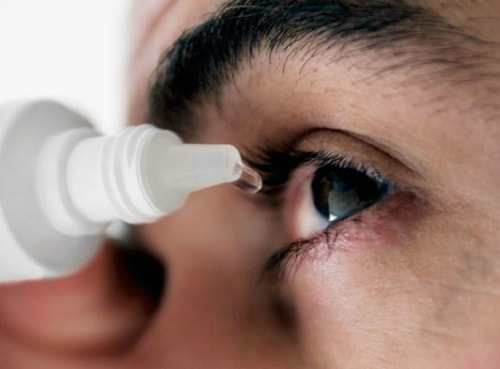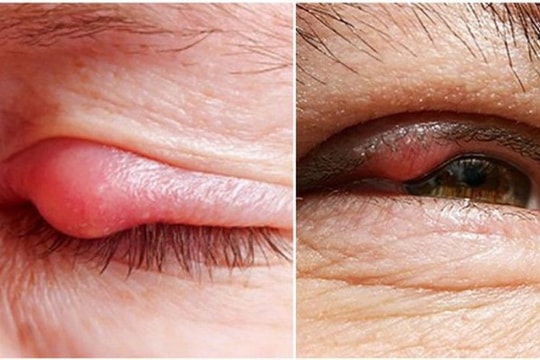Prevent pink eye when the weather changes
Pink eye is common when the weather changes from hot to rainy and humid.
The complicated weather has caused pink eye to appear in some localities.The Department of Preventive Medicine, Ministry of Health, has issued recommendations to help people effectively prevent epidemics. This is a diseaseis very easy to catch, easy to spread in the community and cause an epidemic. Up to now, there is no vaccine to prevent the disease, no specific treatment and people who have had pink eye can still be infected again just a few months after recovering from the disease.
The main cause of pink eye is the Adenovirus virus or bacteria such as streptococcus, staphylococcus, pneumococcus. The disease often occurs in summer to late autumn, when the weather changes from hot to rainy, the air humidity is high, when the seasons change. These are the times when the human body, especially those who are sensitive to the weather, are easily tired, and have a weak immune system, making it susceptible to infection. In addition, a dusty environment, poor hygiene, the use of polluted water sources, and the sharing of household items such as towels, pillows, etc. are also favorable conditions for the disease to develop and become an epidemic.
Pink eye is mainly manifested by red eyes and discharge. The patient usually has red eyes first, then spreads to the second eye. Common symptoms are that the patient feels uncomfortable in the eyes, then feels like there is sand in the eyes. The eyes have a lot of discharge, in the morning when waking up, both eyes are difficult to open due to a lot of discharge sticking together. The eyelids are swollen, puffy, the eyes are red due to blood vessel congestion, pain, discharge, watery eyes. Some cases of conjunctivitis with pseudomembrane (a white, tough membrane that can only be seen when the eyelid is lifted) often take longer to heal. The patient may also have additional symptoms such as fatigue, mild fever, sore throat, cough, and lymph nodes in the ear.
 |
| Illustration: HM. |
Pink eye can be transmitted through:
- Direct contact with sick people through the respiratory tract, tears, saliva, handshakes, especially the tears of sick people are places that contain a lot of viruses.
- Holding, grasping, touching objects contaminated with the disease such as doorknobs, stair buttons, phones, objects, personal belongings of sick people such as towels, wash basins...
- Sharing personal items such as towels and pillows.
- Using water sources contaminated with pathogens such as ponds, lakes, swimming pools.
- Habit of rubbing eyes, touching nose, mouth.
- Hospitals, offices, classrooms, workplaces, public places, on buses, trains, planes... are places with high density of people and close proximity, making it easy to spread diseases.
Although pink eye is an acute disease with dramatic symptoms and is easily transmitted, it is usually benign and leaves few sequelae. However, the disease often has a great impact on daily life, study and work. There are many cases where the disease lasts for a long time, causing complications that affect vision later, so everyone needs to be aware of disease prevention and need to be treated promptly when sick.
When someone is sick or suspected of having pink eye, the patient needs to comply with:
- Clean eye discharge at least twice a day with damp tissue or cotton, throw away the tissue after wiping, do not reuse.
- Do not put eye drops in the healthy eye that are infected.
- Avoid dust and smoke, wear sunglasses.
- Patients need to rest, isolate, and take medication as prescribed by the doctor.
- Do not buy eye drops on your own.
- Do not use other people's eye drops.
- Suspected cases of pink eye should go to a medical facility for examination, consultation and treatment. Absolutely do not apply leaves such as betel leaves, mulberry leaves, etc. to the eyes.
The pathogen can survive in the environment for several days and the patient can still be a source of infection a week after recovery. Therefore, the best way to prevent the disease is to thoroughly implement hygiene measures and isolate the patient.To prevent the disease, it is necessary to proactively take the following measures:
- Wash your hands regularly with soap and clean water.
- Do not rub your eyes, nose, or mouth.
- Do not share personal items such as eye drops, towels, glasses, masks, etc.
- Clean eyes, nose, and throat daily with regular eye drops, nose drops, and mouthwash.
- Use soap or common disinfectants to disinfect the patient's belongings and utensils.
- Limit contact with people who are sick or suspected of having pink eye.
- People with or suspected of having pink eye should limit contact with others. They should take time off from school and work to avoid infecting others and spreading the disease to the community.
According to VNE
| RELATED NEWS |
|---|


